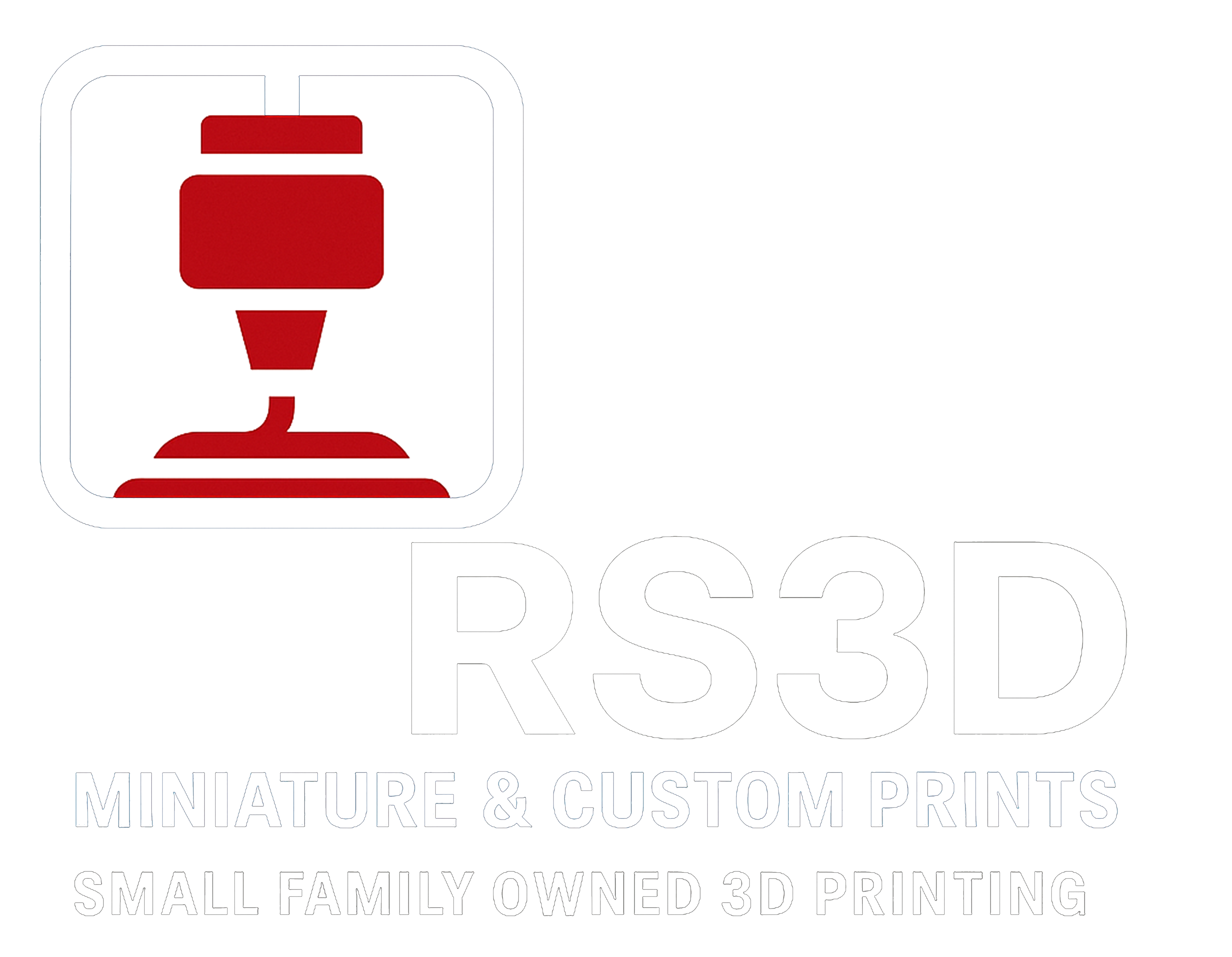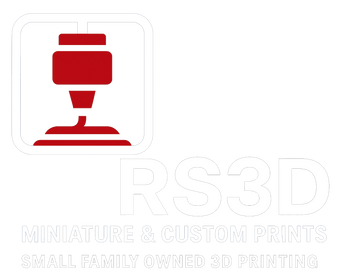Pro PCTG, Fire Engine Red, 1.75mm
⚠️ WARNING ⚠️
Choking Hazard – Small Parts for most items on this site.
Not for children under 3 years old.
3D-Fuel Pro PCTG is like PETG but better in many ways. It is tougher (up to 30x tougher than PETG), more chemically resistant, and has even greater clarity than PETG. Pro PCTG is an easy-to-use material with a lower moisture absorption rate than PETG and doesn't require an enclosure - use it just like PETG.
The broad color selection and ease of printing make it an ideal choice for printing in a multi-color 3D printing system like the Bambu Lab AMS.
Print Profiles
Print profiles for Pro PCTG on the Bambu Lab printers are available here.
Bambu AMS Compatibility
Since October 2023, the 3D-Fuel Standard PLA+ has been manufactured using an AMS-compliant spool (more info on our spool sizes and weights). Since it takes time for some colors to move through our warehouse inventory, you may receive an older spool type. This is still compatible with the AMS, but you must leave the lid open a few mm.
Pro PCTG is 20-50% More Impact Resistant Than PETG
Key Reasons for Better Impact Toughness:
-
Molecular Structure:
- PCTG contains cyclohexane dimethanol (CHDM), which gives it increased flexibility and toughness compared to PETG’s ethylene glycol structure.
-
Flexibility vs. Brittleness:
- PCTG is more ductile, allowing it to absorb and dissipate energy during impact without cracking or shattering.
-
Layer Adhesion:
- PCTG has better inter-layer bonding when 3D printed, reducing weak points in the structure where impact forces might cause failure.
Real-World Implications:
-
Drop Resistance:
- PCTG parts are less likely to crack, chip, or break when dropped, making it ideal for high-impact applications like enclosures or wearable devices.
-
Repeated Stress:
- PCTG can endure repeated bending or sudden forces better than PETG, making it more suitable for hinges, clips, and flexible parts.
-
Durability in Extreme Conditions:
- PCTG resists embrittlement under low temperatures, maintaining its toughness in environments where PETG may fail.
Example Use Cases Benefiting from PCTG's Toughness:
- Protective housings for electronics or tools.
- Drone parts and propeller guards.
- Flexible clips, snap-fits, and living hinges.
- Impact-resistant containers or enclosures.
Chemical Resistance
| Chemical Type | Examples | PCTG Advantage | PETG Limitation | Comparison (CRR) |
|---|---|---|---|---|
| Alcohols | Isopropyl alcohol (IPA), ethanol, methanol | Resists prolonged exposure without degrading or cracking. | Degrades or stress cracks with high alcohol concentrations over time. | 1.8 |
| Hydrocarbons | Hexane, heptane, gasoline, mineral spirits | Better resistance to hydrocarbon-based solvents. | Softens or weakens when exposed to hydrocarbons. | 2.0 |
| Acids | Acetic acid, citric acid, phosphoric acid | Maintains structural integrity in mild to moderately concentrated acids. | Degrades faster in acidic environments at higher concentrations. | 1.4 |
| Bases (Alkalis) | Sodium hydroxide, potassium hydroxide, ammonium hydroxide | Better resistance to strong alkalis. | May crack or degrade when exposed to strong bases. | 1.33 |
| Cleaning Agents | Bleach (sodium hypochlorite), industrial degreasers, detergent solutions | Withstands harsh cleaning agents without discoloration or damage. | Discolors, cracks, or loses properties with harsh cleaning agents over time. | 1.5 |
| Oils and Lubricants | Engine oils, hydraulic fluids, cutting oils | Resists degradation from prolonged exposure to oils. | Absorbs oils over time, potentially leading to swelling or weakening. | 1.6 |
| Ketones | Acetone, methyl ethyl ketone (MEK) | Performs slightly better in low-concentration ketones. | Softens or dissolves more readily in ketone-rich environments. | 1.2 |
Pro PCTG Has Lower Moisture Absorption Than PETG
-
PETG:
- Hygroscopic: PETG absorbs moisture from the air, but at a relatively low rate compared to more hygroscopic materials like nylon or TPU.
- Moisture Absorption Rate: Approximately 0.2–0.3% by weight after prolonged exposure to humid environments.
-
Effects of Moisture:
- During printing, moisture in PETG can lead to stringing, bubbling, and surface defects due to water vaporizing in the hotend.
- Mechanical properties (like impact strength) can slightly degrade over time with prolonged exposure to high humidity.
-
PCTG:
- Slightly Lower Moisture Absorption: PCTG absorbs less moisture than PETG, typically around 0.1–0.2% by weight.
- Improved Resistance: Due to its cyclohexane dimethanol (CHDM) component, PCTG’s molecular structure makes it less hygroscopic and more resistant to moisture-induced degradation.
-
Effects of Moisture:
- PCTG generally performs better than PETG in humid conditions, retaining clarity, toughness, and dimensional stability for longer periods.
Why the Difference?
-
Molecular Structure:
- PETG’s glycol modification increases flexibility but leaves the material slightly more hygroscopic.
- PCTG’s modified structure with CHDM reduces the polar sites available for moisture interaction, resulting in less absorption.
Practical Implications:
-
3D Printing:
- PETG: Requires drying more frequently, especially if exposed to humid environments, as even slight moisture absorption can lead to print defects (bubbling, stringing, poor adhesion).
- PCTG: Requires less frequent drying, making it easier to handle in environments with higher humidity. It is also more forgiving if printed without drying.
-
Storage:
- Both materials benefit from being stored in airtight containers with desiccant.
- PCTG will be less prone to degradation if exposed to moisture for extended periods compared to PETG.
-
Long-Term Use in Humid Environments:
- PCTG is more stable and less likely to lose mechanical properties over time in high-humidity settings.
Drying
For both materials, drying before printing and proper storage is recommended for optimal performance, but PCTG is less maintenance-intensive in this regard.
When you need to dry Pro PCTG, use a temperature of 60-70C for 4-8 hours.
Available In 25 Colors
| Color Name | Display | Hex Code | Closest Pantone® |
| Natural | Clear | Clear | |
| Brightest White | #EBECEA | P 179-1 U | |
| Snow White | #F2F2ED | P 1-1 C | |
| Desert Tan | #C1AC98 | 15-1309 TPG | |
| Flat Dark Earth | #977B6C | 4257 CP | |
| Chocolate Brown | #58413B | P 67-16 C | |
| Bubblegum Pink | #EAAAB6 | 4064 UP | |
| Grape Purple | #5E528F | 7679 CP | |
| Cobalt Blue | #0C3681 | 2736 CP | |
| Ocean Blue | #0069A4 | 2935 CP | |
| Olive Green | #545746 | 176-15 C | |
| Grass Green | #4D9D5A | P 139-8 U | |
| LulzBot Green | #C8CB18 | 14-0443 TPG | |
| Daffodil Yellow | #FFC02C | 109 UP | |
| Tangerine Orange | #EF744C | 16-1349 TPG | |
| Fire Engine Red | #C73229 | P 52-16 C | |
| Iron Red | #8A292A | P 54-8 C | |
| Metallic Copper | #894D3F | 7601 CP | |
| Metallic Gold | #C58F4C | 16-0950 TPG | |
| Metallic Silver | #7D8081 | Cool Gray 11 U | |
| Industrial Gray | #858B8D | Cool Gray 10 U | |
| Charcoal Gray | #4D545A | 296 UP | |
| Midnight Black | #353535 | 19-4006 TPG | |
| Fluorescent Orange | #EA7A68 | P 45-5 U |
Additional Filament Information
- Recommended Printing Temperature: 260-280C
- Recommended Bed Temperature: 70-80C
- Bed Surface: PEI, heated bare glass, BuildTak, WhamBam
- Recommended Print Speed: 60 – 250 mm/s
Quality:
All 3D-Fuel 3D printer filament is manufactured in the United States. We have complete control over the manufacturing process and can ensure consistent quality for every spool. Learn more about 3D-Fuel filament quality.
Diameter Tolerance:
Variable 3D filament diameters can cause significant problems in your 3D printer. We use a multi-axis laser measurement system to control our filament diameter and ovality in real time during production.
Packing Information:
A full 1kg (2.2 lbs) of Pro PCTG plastic filament arrives on a durable plastic reel compatible with the Bambu Lab AMS. The reel is vacuum-sealed with a desiccant packet to keep out moisture.
Test Printing:
The 3D-Fuel test lab features multiple brands of 3D printers, including Bambu Lab, Creality3D, Prusa, Raise3D, MakerBot, LulzBot, FlashForge, and more. We use what we manufacture in our 3D printing operations to ensure that our filament provides the best quality possible.
RS3D Return Policy
At RS3D, we take great pride in the quality of our products and packaging. As a small, family-owned business, we ensure each order is crafted with care and arrives in excellent condition.
Please review our return policy below:
All Sales Are Final
We do not accept returns or exchanges for non-damaged items.
Damaged or Incorrect Items
If your order arrives damaged, defective, or incorrect, we’re happy to offer a replacement, refund, or store credit.
To qualify:
- You must contact us within 7 days of delivery
- Include clear photos of the item(s) and packaging
- Provide a brief description of the issue
Exceptions / Non-Returnable Items
We do not accept returns on the following:
- Perishable goods (e.g., food, flowers, plants)
- Custom or personalized items
- Personal care products (e.g., beauty items)
- Hazardous materials, flammable liquids, or gases
We also cannot accept returns on sale items or gift cards.
If you're unsure whether your item qualifies, feel free to reach out.
Exchanges
Exchanges may be available on a case-by-case basis. Please contact us to discuss.
Refunds
Once we receive and inspect your return:
- We’ll notify you of approval status
- Approved refunds are issued to your original payment method within 10 business days
Please allow additional time for your bank or credit card company to process the refund.
If more than 15 business days have passed since your return was approved, contact us at store@rs3d.us.
How to Report an Issue
Please email store@rs3d.us with the following information:
For damaged or incorrect items:
- Your order number
- Photos of the damaged or incorrect item(s) and packaging
- A brief description of the issue
- Your preferred resolution:
For missing items:
- Your order number
- Name of the missing item
- A brief description of the issue
- Your preferred resolution
Return Shipping Costs
- If the issue was caused by shipping damage or production defects, RS3D will cover return shipping.
- If the issue was caused by customer use, the customer is responsible for return shipping.
RS3D Shipping Policy
At RS3D, we strive to ship your order as quickly as possible. Please note the following:
- Production Time: Some items are made to order and require additional time to be 3D printed.
- Stock Levels: Not all items may be in stock at the time of purchase. Orders may include both in-stock and made-to-order items.
- Estimated Delivery Time: Orders typically ship within 2 to 10 business days, depending on availability and production time.
If you have any questions regarding your order or our policies, please contact us at store@rs3d.us.
We are committed to providing excellent customer service and stand behind the quality of every 3D-printed item we ship.
Thank you for supporting our small business!
Discover more in our FAQ
1. Do you offer free shipping?
We offer free shipping on certain promotions. Standard shipping costs will be calculated at checkout unless otherwise stated.
2. How long will it take to get my order?
Most orders ship within 2–10 business days, depending on stock and production time. Some items are made to order and may require extra time to 3D print.
3. Do you ship internationally?
Currently, we primarily ship within our designated service areas. If you are outside our region, please contact us at store@rs3d.us to confirm availability.
4. Can I return or exchange an item?
All sales are final for non-damaged items.
We accept returns only for damaged, defective, or incorrect items reported within 7 days of delivery.
5. What should I do if my order is damaged or incorrect?
Email store@rs3d.us with:
- Your order number
- Photos of the item and packaging
- A short description of the issue
replacement, refund, or store credit.
6. Are any items non-returnable?
Yes. We cannot accept returns for:
- Perishable goods
- Custom/personalized items
- Personal care products
- Hazardous materials or flammable liquids/gases
- Sale items or gift cards
7. How do refunds work?
Once your return is approved, refunds are issued to your original payment method within 10 business days.
Please allow extra time for your bank or card company to process it.
8. Do your products contain small parts?
Yes. Many RS3D products include small parts that may pose a choking hazard. Not for children under 3 years old. Always use products as intended and under supervision.
9. What materials do you use for 3D printing?
We use a variety of filaments, including PLA, ABS, PETG, TPU/TPE, Nylon, and specialty blends like carbon fiber–filled, wood-filled, and metal-filled PLA. If you need specific materials, contact us before ordering.
10. How is my personal data protected?
We use HTTPS encryption, secure payment gateways, and industry-standard security measures to protect your data.
We never sell your information and only share it with trusted service providers when necessary.
11. How can I contact RS3D?
You can reach us at:
📧 store@rs3d.us
🌐 www.rs3d.us














